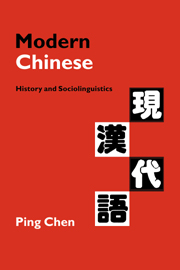Book contents
- Frontmatter
- Contents
- List of tables
- Preface
- Acknowledgements
- List of abbreviations
- 1 Introduction
- Part I Modern Spoken Chinese
- Part II Modern Written Chinese
- 5 Development and promotion of Modern Written Chinese
- 6 Norms and variations of Modern Written Chinese
- 7 Dialect writing
- Part III The modern Chinese writing system
- Notes
- References
- Index
7 - Dialect writing
Published online by Cambridge University Press: 05 June 2012
- Frontmatter
- Contents
- List of tables
- Preface
- Acknowledgements
- List of abbreviations
- 1 Introduction
- Part I Modern Spoken Chinese
- Part II Modern Written Chinese
- 5 Development and promotion of Modern Written Chinese
- 6 Norms and variations of Modern Written Chinese
- 7 Dialect writing
- Part III The modern Chinese writing system
- Notes
- References
- Index
Summary
Single standard written language for dialects
None of the major Chinese dialects other than Northern Mandarin has an established writing tradition, in spite of the fact that they represent very large populations and are distributed over very large geographical areas – often much larger than is the case with most of the Modern European languages. As a result, the acquisition of literacy for native speakers of the non-Northern Mandarin dialects was normally in wényán before the New Culture Movement, and since then has been in Modern Written Chinese.
The uniformity provided by Modern Written Chinese as a written code for all Chinese is achieved at the expense of non-native speakers of Northern Mandarin. It is more difficult for Southern dialect speakers to acquire Modern Written Chinese than it is for native speakers of the base dialect of Modern Written Chinese. Actually, this difficulty was raised as an important objection to the replacement of wényán by báihuà as the standard written language (J. Li 1935). It was argued that, as wényán was dissociated from all of the contemporary dialects, the dialectal background of learners does not make any difference in its acquisition; with báihuà, on the other hand, southerners are at a linguistic disadvantage in comparison with native speakers of Northern Mandarin. This concern, as it turned out, was overridden by the urgent need for a written language that was closer to the vernacular of the majority of population and thus more suitable for a modernizing society.
- Type
- Chapter
- Information
- Modern ChineseHistory and Sociolinguistics, pp. 114 - 128Publisher: Cambridge University PressPrint publication year: 1999



